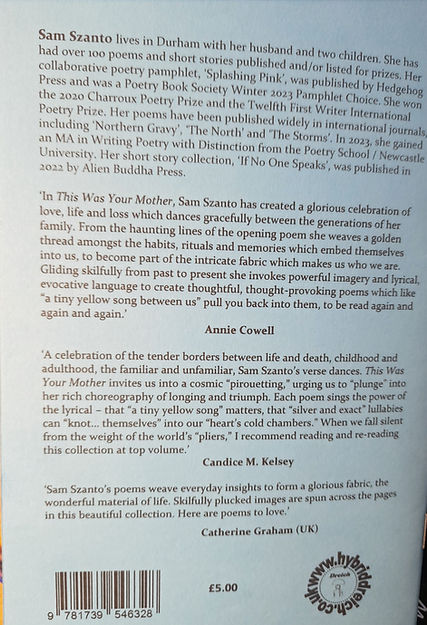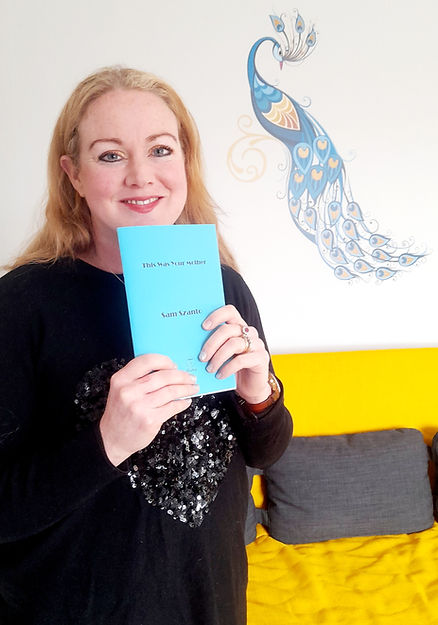20 Questions with... Sam Moe
- samszanto2
- Feb 10, 2023
- 7 min read

Sam Moe is the first-place winner of Invisible City’s Blurred Genres contest in 2022, and the 2021 recipient of an Author Fellowship from Martha’s Vineyard Institute of Creative Writing. Her first chapbook, “Heart Weeds,” is out from Alien Buddha Press and her second chapbook, “Grief Birds,” is forthcoming from Bullshit Lit in April 2023. You can find them on Twitter and Instagram as @SamAnneMoe.
Please introduce yourself. Where are you from? What was your life like growing up?
I’m Sam Moe, a poet from Massachusetts. Growing up, I spent a lot of time between our home in Massachusetts and my grandparents' apartment in New York City. I mostly hung out in bookstores and city stoops. When my sister and I were kids we would play on the different themed NYC playgrounds, which have life-sized statues of different animals and dinosaurs made of marble.
Did you always want to be a writer? If you also work, what do you do / did you do?
I did always want to be a writer, but I went to art school first (for my undergrad). I still make art consistently, though I’m currently in a creative writing program. I currently work as a teacher, and I used to work as a server/host/busser, which influenced a lot of my poetry.
Tell us about your most recently published work in a sentence.
"Heart Weeds" braids together family, ecology, and gastronomy in the form of prose poems, form poems, and free verse.
What are you working on right now?
I’m working on a new book of poetry about swamps and fungus.
Do you have a writing routine, and if so what is it?
I spend a lot of time at a very messy desk, journaling and writing poems. I try to break up my writing time with reading, especially if I’m feeling stuck/uninspired. I wish I worked on my novel every day, but I’m in this poetry zone where I try to write poems as frequently as possible (when I have the energy/time).
Where do you write – always in the same space, or different places? Can you write ‘on the move’?
I write at this messy desk coated in paint, confetti, and glitter. I can write on the move—I used to write when on long trips in the backseat of my parents’ car, or on NYC/Boston subways.
What advice do you have for other authors who are starting out? What is the best advice you’ve heard?
I think something that’s been fundamental to me has been trusting myself. I trust that I’ll get the writing done. Even if I’m burnt out and exhausted, I know that once I recuperate, I’ll be excited to write again (though recuperation times vary). The best writing advice I ever heard was from Alexander Weinstein at the Martha’s Vineyard Institute of Creative Writing. He told us to send our inner critics home, and that our time at MVICW was going to be all about prioritizing play in our work.
Do you enjoy doing live readings or are they a necessary evil – or somewhere in between?
I love live readings! I take so many notes when other folks are reading. When I’m the one reading I’m usually nervous, and that honestly never goes away—I have no idea how to fix that, but I’m still having fun (even though I’m anxious).
Are there recurring themes in your work? Where do you feel these emanate from if so?
Definitely different environments, especially swamps, bogs, forests, specific types of architecture, cities, bodegas. I think I’m always trying to write myself back to Manhattan/Massachusetts. I love being out in nature, but also getting lost in cities. It’s always a mixture between my obsession with NYC architecture and the forests behind my childhood home.
Should writers have a moral purpose? What is the purpose of a writer in today’s society?
I don’t think writers should have a moral purpose, especially since I think poetry exists in this space of action and justice, and we use poetry to question the idea of morals/whether or not we’re sticking up for our communities—poetry is used to foster community, to bear witness and document violence, and also, love—if anything, I think we should continue questioning other’s ideas of morals when they intersect with and promote/justify harm against multiple marginalized communities and individuals. I think that bleeds into how I see writing in today’s society—writing is active, and action, but also, comfort and support. I think everyone’s work shows up when you need it, if that makes sense. I used to have a friend who said books would show themselves to me when I needed them most (after I complained I kept buying too many books) and I believe that.
Do you write between genres or not?
Yes, always. It used to be a problem that I couldn’t write poetry about anything other than fantasy/plot (lots of prose poems and sestinas about my novel’s characters) but now I write poems braided with memoir and elements of metaphor/fiction. I also write fiction about my reality, though it might not look exactly how others perceive my reality—but my history is strange, and therefore my writing is strange (and true). And the same goes for creative non-fiction—I love lyric essays, hermit crabs, and braided essays since they remind me a lot of the way poems move and communicate.
Which living writers do you most admire?
Jose Hernandez Diaz, Lynne Schmidt, Kaitlyn Airy, Joy Baglio, Sofía Aguilar, Safiya Sinclair, Danez Smith, Donika Kelly, Ashley M. Jones, Ocean Vuong, Gabrielle Bates, Melissa Lozada-Oliva, Ada Limón, Cathy Park Hong, Maggie Nelson, Craig Heyne, Sandra Cisneros, Franny Choi. (I keep a running list of everyone’s poetry/websites/books so I can keep up with their wonderful work). ((Twitter is also good for this)).
Which dead writers do you most admire?
Gloria Anzaldúa is a writer whose work I admire so much. I read "Borderlands / La Frontera" a few years ago and it changed how I write. I’ve never seen hybrid work that braided together poetry and theory, untranslated Chicanx Spanish and history. She was of course not the only writer experimenting and moving between genres, but she really left an impact on me. She’s changed how I see my identity as third-generation Ecuadorian American, and how I see and use Spanish.
What’s the book you wish you’d written?
I love this question. I don’t think I could ever claim to be good enough, or similar enough, to have written the books which consume my mind. I will say, I think about Carmen Maria Machado’s "In the Dream House" all the time. One of the first pages says, “If you need this book, / it is for you”—I think about that constantly. I don’t wish I had written In the Dream House, but I do wish I could write about my history and my trauma in a way that feels true and honest for me. If anything, "In the Dream House" has made me feel less alone, and less afraid to share my story(ies), too. I think I wish I could write about what happened, but I don’t know how (yet). Maybe I’ll never figure it out.
What other external influences do you have: nature/place, music etc?
I love collage. I collage all my bookshelves and furniture so I have something to look at/think about while I write. I also like to have a lot of books and journals near me, and it’s occurred to me recently this might be my version of creating an altar. For my family, altars are really important, and in my late grandmother’s apartment we have an altar for her and my grandfather and great grandmother. I used to think I wasn’t connected enough to create an altar, since to me it’s a mixture of brujeria and religion, but I think the way I carry around my diaries/journals/books and other objects (funeral cards, rosary beads) is my way of carrying around my altar. I obsess and write over objects, grief, architecture, nature, and gastronomy. Especially the gastronomy—I love food metaphors.
Do you suffer from ‘writer’s block’ and how do you overcome it if so?
It feels really shameful, somehow, to say I no longer believe I have what I used to conceptualize as ‘writer’s block,’ but I’ve started to think of it in terms of energy and exhaustion. If I’m really exhausted and burnt out, I usually don’t write. And even if I wanted to, my mind is generally blocked with ruminations and anxiety—so it’s more the stressors that prevent me from trusting myself enough to write something. And I overcome that by resting and recuperating. I’m historically terrible at rest, but I’ve been trying to rest more. And I read other people’s work—I read all the genres, watch movies and anime, listen to music, paint, draw. I do things that I hope will make me feel excited to return to the page.
What’s been your favourite reaction to your writing?
Someone once cried while reading one of my poems because it reminded them of something they’d lost. I didn’t think my writing was moving, or capable of moving people—that was just really astounding, and I was not expecting that. It’s funny, though, because I wrote that poem for them (that particular read/friend) but I didn’t expect a connection, I suppose I was hoping for any response.
How do your family and friends feel about your writing?
My friends are so generous and supportive. They’re always kind to me when I’m stuck, and they help push me when my writing feels stagnant/overanalysed. I think my family likes my writing but, I write about them a lot. I’ve started disguising my history with metaphor, so we’ll see how everyone feels once they decode what I’ve been trying to say.
Do you have a favourite bookshop?
The Strand. I love it there so much. Every time I was feeling anxious/not like myself in undergrad I would go to The Strand and get lost for a while until I felt like a person again. Honestly, every bookstore in New York is amazing. I’ve never been, but I’m obsessed with Sweet Pickle Books and Books Are Magic. Also, I grew up in Book Culture and Westsider Rare & Used Books Inc, those are some amazing bookstores, too. I’m in Illinois now and I shop a lot at Bobzbay—I love Bobzbay so much, and the owner is really cool. (That’s a long list—picking favourites is impossible for me!)
How do you see the future of writing? Will we become more or less dependent on Amazon?
I think the future of writing is going to continue to be awesome, as I think writers are incredible and they’re out there being vulnerable and doing the work and making all of us feel less alone. I hope we continue to tell our stories in any ways we can, the world needs them. I hope we become less dependent on Amazon—Bookshop.org is an amazing resource!










Comments